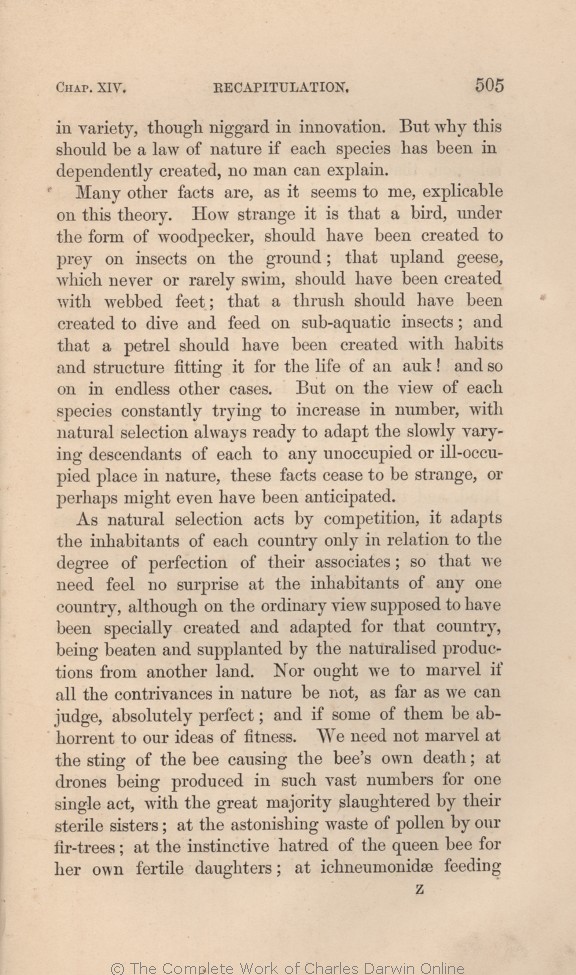Many other facts are, as it seems to me, explicable on this theory. How strange it is that a bird, under the form of
woodpecker, should have been created to | woodpecker, should have been created to 1859 1860 1861 1866 1869 |
| a woodpecker, should 1872 |
| geese, 1859 1860 1861 1866 | | geese 1869 1872 |
| never 1859 1860 1861 1866 1869 | | rarely 1872 |
| rarely 1859 1860 1861 1866 1869 | | never 1872 |
| have been created with 1859 1860 1861 1866 1869 |
| possess 1872 |
| thrush should have been created to 1859 1860 1861 1866 |
| thrush-like bird should have been created to 1869 |
| thrush-like bird should 1872 |
| been created with 1859 1860 1861 1866 1869 |
| the 1872 |
| habits 1859 1860 1861 1866 1872 | | the habits 1869 |
| auk! 1861 1866 1869 1872 | | auk 1859 1860 |
| ..... 1861 1866 1869 1872 | | or grebe! 1859 1860 |
| on 1859 1860 1861 1866 | on 1869 1872 |
| ill-occupied 1859 1860 1861 1866 1872 | | ill-occu- pied 1869 |
| perhaps 1859 1860 1861 1866 | perhaps 1869 1872 |
| 5 blocks not present in 1859 1860 1861; present in 1866 1869 1872 | | We can understand
how it is that such harmonious beauty generally prevails
throughout nature.
That there are exceptions
according to our ideas
of beauty, no one will doubt
who will look at some of the
venomous snakes, at some fish,
and at certain hideous bats with a distorted resemblance to the human face.
Sexual selection has given,
generally to the males alone but sometimes to both sexes,
the most brilliant and beautiful colours, as well as other ornaments, to our
birds, butterflies, and a few
other animals.
It has
rendered the voices
of many
male birds
musical to their
females,
as well as to our ears.
Flowers and fruit have been rendered conspicuous by gaudy
colours in contrast with the green foliage, in order that the flowers might
be easily seen, visited, and fertilised by insects, and the fruit have their
seeds disseminated by birds.
|
| 1 blocks not present in 1859 1860 1861 1866 1869; present in 1872 | | How it comes that certain colours, sounds, and forms should give pleasure to man and the lower animals,— that is, how the sense of beauty in its simplest form was first acquired,— we do not know any more than how certain odours and flavours were first rendered agreeable.
|
|
As natural selection acts by competition, it
adapts | adapts 1859 1860 1861 1866 1872 | | renders 1869 |
| the 1859 1860 1861 1866 1869 |
| and improves the 1872 |
| only 1859 1860 1861 1866 1872 | | perfect only 1869 |
| the degree of perfection of their associates; 1859 1860 1861 1866 |
| the other inhabitants; 1869 |
| their co-inhabitants; 1872 |
| inhabitants 1859 1860 1861 1866 | | species 1869 1872 |
| specially created and 1859 1860 1861 1866 |
| created and specially 1869 1872 |
| or 1861 | | Nor 1859 1860 1866 1869 1872 |
| perfect; 1859 1860 1861 1866 1869 | | perfect, 1872 |
| and if some 1859 1860 1861 1866 1869 |
| as in the case even 1872 |
| them 1859 1860 1861 1866 1869 | | the 1872 |
| be 1859 1860 1861 1866 1869 |
| human eye; or if some of them be 1872 |
| bee 1859 1860 1861 1866 1869 | | bee, 1872 |
| causing 1859 1860 1861 1866 |
| when used against an enemy often causing 1869 |
| when used against an enemy, causing 1872 |
| bee's 1859 1861 1866 1872 | | bees 1860 1869 |
| vast 1859 1860 1861 1866 | | great 1869 1872 |
| with the great majority 1860 1861 1866 |
| and being then 1859 1869 1872 |
| queen bee 1859 1860 1861 1866 1869 | | queen-bee 1872 |
|









